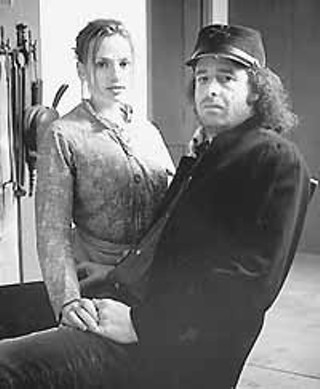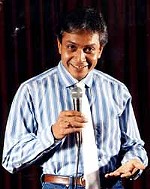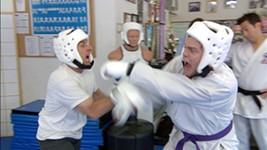Soldier of Fortune
Steven Wright and the Big Questions of Life
By J. C. Shakespeare, Fri., March 10, 2000

Steven Wright does stand-up comedy like nobody else. His exquisitely crafted one-liners and dancing quantum leaps of logic reveal a mind that has spent many hours in contemplation. With his lethargic monotone and turtle's pace delivery, Wright offers hilarious, bizarre observations that are the antithesis of your comic hack's high-energy, wacky hijinks. While his comic counterparts dress in flashy blazers and glitzy Vegas-style tuxedoes, Wright opts for simple flannel shirts and corduroys. His unruly hair makes the Three Stooges' Larry look like a well-groomed fop. Image means nothing to Wright -- the joke is the thing. When your jokes are as good as Wright's, you don't need the bells and whistles. From the beginning of his life in show business, the phlegmatic comic from Boston made success look easy. Two years into his career, a talent scout saw his act and booked him on The Tonight Show. Johnny Carson was so impressed with him that he invited Wright back to the show one week later -- thereby officially ordaining Wright as a comic genius.
In 1989, Wright ventured into the world of film when he wrote and starred in "The Appointments of Dennis Jennings," a 30-minute film produced by HBO. Wright played the title role, a neurotic boob whose life is ruined by a conniving psychiatrist (Rowan Atkinson). Not surprisingly, the film's humor operates on such a high level, with so many odd and unexpected quirks, that trying to anticipate what will happen next is like trying to drive a car down a roller-coaster track. The film didn't just make a splash -- it won the Academy Award for Best Short. Not bad for a first effort.
Ten years passed before Wright made another film, an independent project entitled "One Soldier," which premiered at the Aspen Comedy Festival last year. Wright will be in town to promote the film, which plays at this year's SXSW Film as part of the Shorts 1 program. "One Soldier" tells the story of a man returning home after the Civil War. All he wants to do is chop down trees and play his harmonica, but the big questions of life won't leave his fevered brain alone. It is a fine blend of deep theological ponderings, modern Zen koans, and comic schtick. Like Wright's live stand-up, the film's slow pace and ponderous subject matter have a rather hypnotic effect, drawing one into the skewed reality of Wright's brilliant mind. It is a delightful half-hour trance, one that should not be missed when "One Soldier" plays during SXSW. ("One Soldier" will also run on the Independent Film Channel starting next month.)
We caught up with Steven Wright by phone when he was taking a step back from the "raging river" of present-day life in America. His stage persona is not an act -- he really speaks that slowly and methodically. If you know what Wright sounds like, imagine his voice in your head as you read his simple, sometimes profound, answers.
Austin Chronicle: "Dennis Jennings" was a pretty rip-roaringly funny film. "One Soldier" strikes me as a much more philosophical work. Can you pinpoint a reason for this?
Steven Wright: Uh, I think that, um, since they're 10 years apart, I was thinking more about different stuff 10 years later.
AC: When the film premiered in Aspen last year, what kind of response did it get?
SW: Two different audiences laughed at the whole -- well, it's weird, they laughed at different things. But it's been received well. It's played in Boston, somewhere in England, somewhere near San Francisco. I've seen it with audiences three times. Then it was in the New York comedy festival. Someone I know went and told me they laughed at it there.
AC: Do you feel any pressure when you're watching your film with a crowd?
SW: Yeah, I felt that kind of like tension there, but I tell you, it's better than when you're standing right there [doing stand-up]. No matter what happens [at a movie], they're not even looking at you. You're in a back room. If it plays at some festival and they're not laughing, I'm playing pool in Connecticut.
AC: So when you win the Academy Award with your first short film, how do you follow that?
SW: I didn't think I felt any pressure, but looking back on it, I guess I did subconsciously, because I never made another one until "One Soldier."
AC: Yeah, 10 years later.
SW: I think it kind of froze me. But I wanted to do this one myself, to see if I could direct. Do it small scale, 16mm, black and white. I wanted to learn by doing it.
AC: What did you learn from directing that you didn't know before?
SW: I learned that the editing process was unbelievably exciting, and that was my favorite part of the whole thing. I found it fascinating -- just the endless options, the timing, the music, the different shots and everything. To me, creating all those elements, mixing them, screwing with them, moving them around, was just amazing.
AC: Is there a particular reason you chose to set "One Soldier" during the Civil War?
SW: Years ago I bought a Civil War hat. And I thought, "Someday, I'd like to be in a Western." As time went by, I thought, "No one's going to put me in a Western. I'm going to have to make my own Western." So that's why. I was in Philadelphia with my girlfriend at the time, and I saw that hat in the store. That's why the whole movie is set in that time.
AC: That's as good a reason as any. Do you ever wish you'd been born in simpler times?
SW: Sometimes I do. I think technology now is out of hand. You know, I like the conveniences. But I think that it's getting too much now.
AC: If you could have chosen a time to be born, when would it have been?
SW: Oh, just about two years earlier than I was born.
AC: One of my favorite scenes in "One Soldier" is where you're standing outside the church, rapping on the window, going, "Hey God, what are you doing in there?" Do you sometimes feel like you've searched for God and found him unavailable?
SW: No, [the soldier] wanted to talk to God, but he didn't want to bother him. He wasn't sure there was a God, but if there was, he didn't want to bother him. That was just joking about the idea that God actually has a house.
AC: I also loved the line about, "God came to me in a dream. He told me I could sleep for 10 more minutes."
SW: Yeah, this giant thing happens, and that's all that's said.
AC: That's a great commentary on all these people that come up with these outrageous things that God tells them.
SW: Yeah, it's never just something small.
AC: You obviously have very heightened powers of observation. That seems like a sort of Zen thing, being totally in the moment, being aware; does that come from any sort of spiritual discipline?
SW: Not really. I think all artists observe more than other people. In my case it had to do more with drawing and painting since I was a little kid. I still paint even now. I do abstract stuff now, but all the way through high school I'd try to draw as realistically as possible. and when you do that you really notice things you wouldn't have noticed before, like the space between a chair and the wall, you notice the spaces in between, and I think all that noticing affected me noticing other stuff.
AC: Your character in "One Soldier" is really obsessed with death. Does that reflect your thinking?
SW: I think I'm more obsessed by the fact that we don't even know why we're here. That's what I'm more obsessed with. It's like a bad trick. Like at the end of the movie, right before I'm executed, I say, "Smart enough to ask and too stupid to answer." That's an abbreviated version of my theory. If we were stupider we wouldn't be asking. If we were smarter we'd be able to answer. But we're right in the middle. It's a torture, a trick.
AC: What kinds of things piss you off?
SW: How slow the universe is expanding. That's pissing me off. I think it could be going a little bit faster. You know, it's been going for a long time now. ![]()









